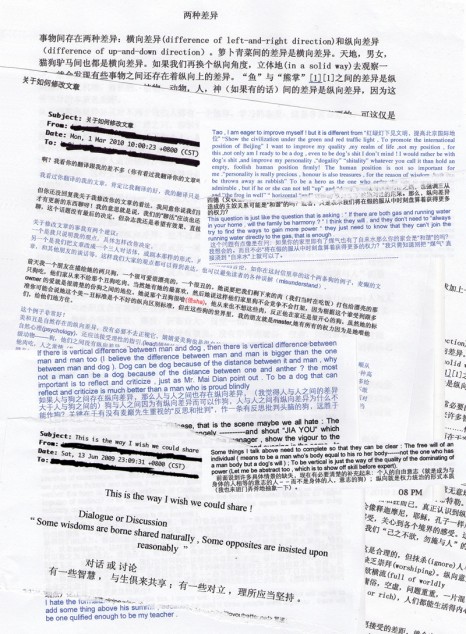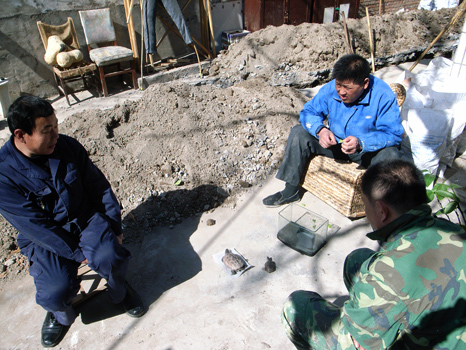
我是一个没有专长的人,常愿意思考点问题,也愿意和朋友交流所思考的东西,相互赞同时,可以相互促动着思索,相互反对时,可以相互纠正着发展,总 之都能使思索得到推动,得到补充,得到一个从另一个角度看问题的机会,从而使头脑变得更丰富,更开放,更智慧。
“纵向差异”的观点我早已有之。可过去仅是一个个人的观察,判断事物方法。后来在与朋友的交流过程中我发现大多数人都不是像我这样看问题。于是争 论开始了,在争论的过程中“纵向差异”的观点开始走向了纵深,开始变得愈加清晰,直至现在我可以用这一观点来理解,解释,解答许多不容易看清楚的 问题,有些也是较为深刻的问题。我想说给大家听听,以求共同探索,或探索“纵向差异”本身,或以此来探索其他问题。
I am a person without any special skills, but I like to reflect on issues and discuss with friends about them. When we agree, it prods our thinking, and when we don’t agree, it gives us the opportunity to clarify paths of thought. At the very least we can always be pushed, further our thinking and gain the opportunity to see problems from a different point of view. From this we enrichen our minds, open up and gain knowledge.
Early on I already held the opinion of “hierarchical differences”. Before it was just based upon my own personal observations, a manner by which to judge objects/matter. Later, during discussions with friends I found that most people do not think about things in the same way that I do. This is how our controversy began, and it is during these disputes that the issue of hierarchical difference began to take on a kind of depth and become ever more clear for me. With these new perspectives I now find that I am able to understand, explain and answer many difficult and ambiguous questions, a few not unprofound questions. I would like to share my thoughts with everyone, and hope that we can explore these ideas together, the nature of hierarchical difference itself or perhaps even another kind of issue.
事物间存在两种差异:横向差异和纵向差异。箩卜青菜间的差异是横向差异。天地,男女,猫狗驴马间也都是横向差异。如果我们再换个纵向角度,立体地去观察一下,就会发现有些事物之间存在着纵向上的差异。“鱼”与“熊掌”之间的差异是纵向差异。无机物,有机物,植物,动物,人,神(如果有的话)间的差异是纵向差异,因为这种差异间包含着差距。
认识到横向差异并且对不同于我的人持有一个包容,学习的态度,这是非常必要的。可这仅是在平面上的自我扩展,属广博之列。而纵向差异则属精深之维度。自古以来许多智者哲人也都指出过纵向差距。如孔子的君子与小人,柏拉图的金银铜铁说,尼采的超人……..他们指出各境界间的差距,其目的不在于说明自己优越于他人,而在于客观地认识这一事实,从而使人有所崇拜,有所敬仰,有所追求……这样人与人之间就可能实现一种在纵向上的交流,这种交流过程也是自我提升的过程。无论他在那一个境界,也无论他能否超越自己的境界。
由于历史上人类曾滥用过人与人之间的差距;人为地,自私地规定了一些差距,近现代以来人们又走向了另一个极端,有些过于强调人与人之间的等同的一面了。有意无意地忽视了人与人之间的纵向差距,进而以言纵向差异为耻,以言纵向差异为不道德,为希特勒。其实希特勒并没有真正认识到纵向差异,他不过是一个狭隘的民族自私狂而已。真正认识到纵向差异并达到最高境界者不会去压迫或消灭另一境界的人,而会像释迦摩尼,耶稣,孔子一样肩负起拯救人类的重任来。因为他们的智慧可以让他们理解,感受,关心到各个境界的感受。这也正是为什么佛教倡导慈悲,耶稣说“爱人如己”,孔子告诫我们“己之不欲,勿施与人”的原因。
认识到人生来平等的一面,有利于社会公平,消除歧视,这是合理的,但抹杀人与人之间的纵向差距就会导致缺乏崇高缺乏崇拜,缺失纵向意义,最终导致消极,颓废,狂妄自大,目空一切,物欲横流。我们当今的社会就是因为没有敬畏,没有崇拜而庸俗,空虚,问题重重,一片混乱!而在一个有良好信仰的社会里,无论物质匮乏与否,人们都能生活得内心平和,充实,井然有序,有希望,有意义……
差距是有益的,差距是必要的,只要是合理的差距,只要是自愿接受的差距,就会产生积极意义。一个人若能成为他所崇拜者的学生,乃至奴仆,那么他将是何等幸福!忠诚的狗若能找到一个好主人,他将是多么幸运!必要时他甘愿为他所崇拜的人献出生命!这都是差距产生的意义。这种意义是二者共有的。
意义源于差异,无差异则无意义。在当今的世界上,文化交流风靡一时,文化交流必到异地异族。于是大量人们从经济落后地区涌向发达地区,也有许多人从所谓的文明地区深入到所谓的蛮荒或半蛮荒地区。经济上的纵向差异是否必然会导致文化上的纵向差异?心灵上的纵向差异?在潜意识当中,人们是怀着怎样的心态去交流的?是为了横向差异,还是为了纵向差异?还是既有横向的也有纵向的?那些是横向的?那些是纵向的?在表面上仅承认横向差异的内心深处,是否存在着纵向心理?想一想这些问题将会怎样?
—–
First written for inclusion in 《穿》WEAR journal number two, not printed, but eventually published at 《塞壬_Siren》online magazine, Issue 1, May 2010.


 时间 posted on: 12 June 2012 |
时间 posted on: 12 June 2012 |  发布者 author:
发布者 author: 
 分类 filed under:
分类 filed under: 

